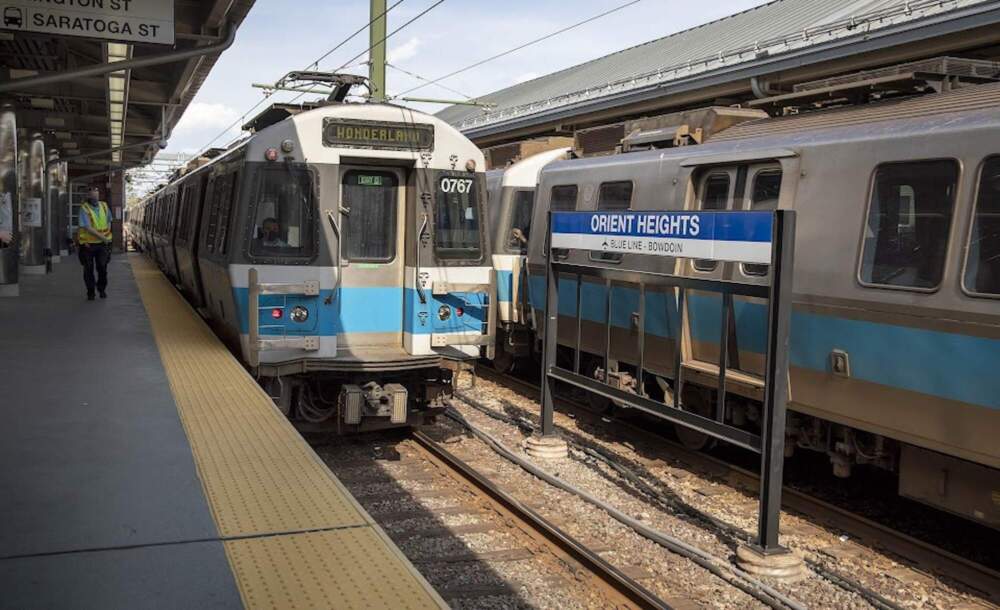Advertisement
Boston's Morning Newsletter
For the first time in over a year, the MBTA has a line free of slow zones

Editor's Note: This is an excerpt from WBUR's daily morning newsletter, WBUR Today. If you like what you read and want it in your inbox, sign up here.
It’s Monday. While we continue to wonder how much Netflix must have paid Tom Brady to agree to that brutal (NSFW) roast last night, let’s get to the news:
Not so blue: For the first time since General Manager Phil Eng took over, the MBTA has a subway line that’s completely free of speed restrictions: the Blue Line. During the line’s two-week partial closure that wrapped up last week, T officials said they were able to lift all 19 speed restrictions. “This Blue Line work is more work than this line has seen in years,” Eng said.
- Zoom in: For riders, it means an end-to-end, back-and-forth ride on the Blue Line is nine minutes faster than before.
- The big picture: There were 230 speed restrictions across the T’s four subway and trolley lines when Eng first started the job in spring 2023, as WBUR’s Andrea Perdomo-Hernandez recently reported. Now, the T’s online slow zone tracker says they’re down to 94.
- Next up: The T’s focus has turned to the Red and Orange line tracks — which are 18% and 17% slow zones, respectively. Partial closures of both lines are scheduled through the rest of spring and summer. Eng says they’re still on track (… sorry) to remove all subway speed restrictions by the end of the year.
- Heads up: The current nine-day Red Line closure between Park Street and JFK/UMass (and between JFK/UMass and Ashmont at night) continues through Friday. Eng says the diversion will allow crews to lift eight of the Red Line’s 54 speed restrictions.
Just in: Steward Health Care announced early this morning it will seek Chapter 11 bankruptcy to restructure its debt. As WBUR’s Elisabeth Harrison reports, the move raises questions about the long-term future of the financially struggling, for-profit health care company’s eight Massachusetts hospitals.
- For the immediate future: Steward says it “does not expect any interruptions in its day-to-day operations” during the bankruptcy process. The Dallas-based chain says its hospitals, medical centers and physician’s offices will remain open and keep serving patients.
- What’s next: Gov. Maura Healey’s administration says it’s “working with Steward and any potential partners to support an orderly transfer of ownership that protects access to care, preserves jobs and stabilizes our health care system.” Healey is slated to hold a press conference on the situation today at 9:45 a.m.
On Beacon Hill: Massachusetts Senate leaders plan to unveil their proposal today to make all 15 of the state’s community colleges tuition-free. (Currently, they’re free only for those over 25 without a college degree.) The plan is expected to be rolled into the Senate’s full budget proposal, which will be released tomorrow.
- One obstacle: The House, which did not include free community college in the budget proposal they passed last month. House Speaker Ron Mariano has emphasized the need to be cautious about spending amid recent state revenue declines.
On the docket: While the State House declined to take action on any of Massachusetts’ six potential 2024 ballot questions before last week’s deadline, there’s still a chance another state institution could. The Supreme Judicial Court will hear legal challenges today against two initiatives that could reshape the ride-hailing industry.
- What’s the difference between these proposed ballot questions? One of them would allow Uber and Lyft drivers to form a union, while the other would define those drivers as “independent contractors” under state law (which has a lot of implications for their legally required wages and benefits). Read more about the lawsuits against them here and here.
- Meanwhile: The ballot question process has moved on to a new stage, since the State House didn’t pass any of the proposals. Supporters now must collect a final round of 12,429 voter signatures before July 3 to secure their spot on the fall ballot.
All clear: Officials in Connecticut have fully reopened the stretch of I-95 in Norwalk that was closed for several days after a fiery gas tanker crash. Crews had shut down part of the major highway to demolish a bridge that was scorched by the fire. Connecticut Gov. Ned Lamont called the quick turnaround “truly remarkable.”
P.S.— The chef behind one of the hottest restaurants in the Boston area will be here tonight. CitySpace’s latest edition of Curated Cuisine features chef Laurence Louie, of Rubato, a modern Hong Kong-style café in Quincy that has garnered national attention. Come hear the story behind Rubato’s rise — and enjoy a bite after the conversation.
